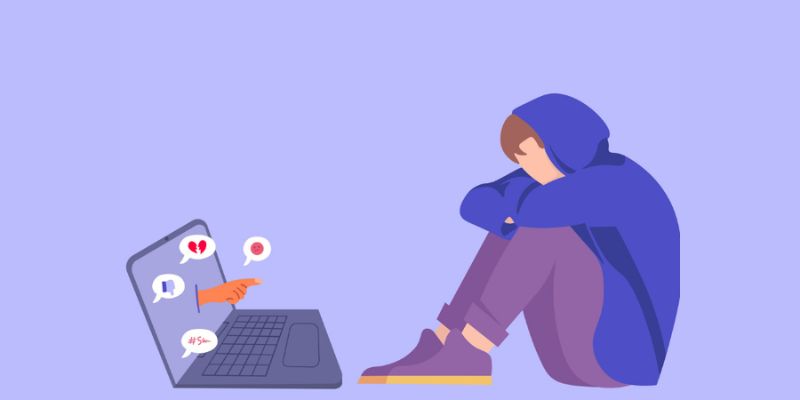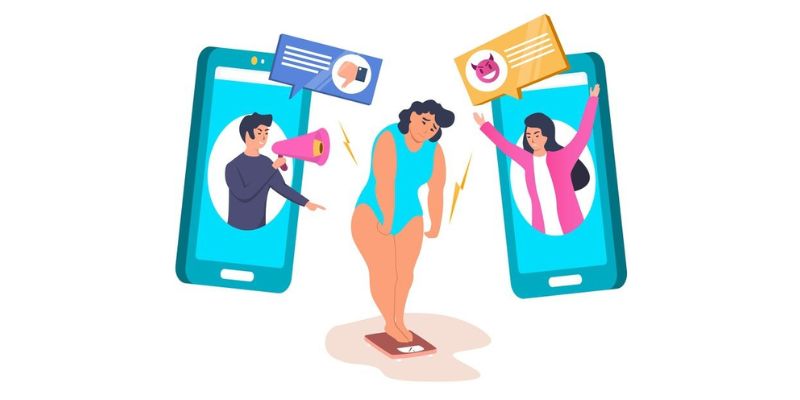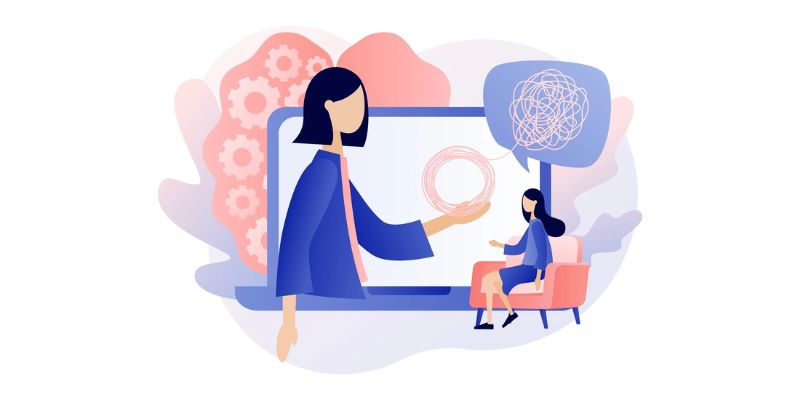How to deal with cyberbullying isn’t just about reactions; it’s about power. Each click can feel like a personal attack, hitting our screens and hearts with equal force. Cyberbullies hide behind devices, flinging words like arrows. But we are not defenseless. Knowledge is our shield, and action our sword. I’ll teach you to stand tall, not just for today, but for the digital future that awaits. Let’s face this challenge head-on, with strategies and strength that can turn the tables on any online menace.
Understanding Cyberbullying and Its Effects on Mental Health
Defining Cyberbullying and Recognizing Its Forms
To fight cyberbullying, we need to know what it is. Cyberbullying happens when someone uses the internet to hurt, scare, or upset someone else, often again and again. It can happen in texts, on social media, and in online games. Forms of cyberbullying include mean messages, spreading lies, or posting embarrassing photos. If you’re facing online harassment, know that you’re not alone and you can take action to protect yourself.
The Psychological Impact of Cyberbullying on Adolescents
Now, let’s talk about how cyberbullying can affect your mental health. Teens who face cyberbullying may feel sad, scared, or alone. They might not want to go to school or talk to friends. Some may even feel sick. These feelings are common, but there are ways to deal with them and come out stronger.
When teens go online, they can face bullies. This can make them feel alone and scared. But help is out there. Let’s learn how to handle these tough times. First, it’s okay to reach out for help. Talk to someone you trust, like a parent, teacher, or friend. They can give you the support you need. Remember, it’s not your fault and you’re not alone.
Next, learn about cyberbullying coping strategies. Take breaks from your phone or computer. Spend time with friends and family who make you feel good. Try keeping a diary to share your thoughts. It can help you make sense of your feelings.
If you’re online and a bully bothers you, don’t respond. Instead, block them and talk to someone about it. Parents and teachers can help you decide what to do next. They might suggest you report the bully to the app or website you’re using. They take these reports seriously and can stop the bully from bothering you and others.
Educational resources can help, too. They show you how to stay safe online and deal with bullies. Remember, you have the power to control your online experience. Use privacy settings to keep your information safe. Choose who you talk to and what you share.
It’s also important to show kindness online. By being a good digital citizen, you can help create a safer internet for everyone. If you see bullying, speak up. Support your friends and report bullies when you need to.
In the end, it’s about how we come together to face cyberbullying. It’s up to all of us to build a community that stands up to bullies. With support, smart online habits, and sticking together, we can face cyberbullying and keep the internet a place for everyone to enjoy.

Proactive Measures to Safeguard Against Cyberbullying
Strengthening Digital Citizenship Among Youth
We must teach our kids how to act right online. What is digital citizenship? It’s knowing how to stay safe and kind online. It’s a skill as key as reading or math. It means knowing what to share and with whom. We guide our kids to be good people online. We talk about honesty, respect, and bullying. We tell them, “If you won’t say it face to face, don’t say it online.”
Setting Up Online Privacy Safeguards and Monitoring
Protecting kids online starts with setting rules. What are privacy settings? They control who sees what you post on social media. We use these settings to block bullies and keep personal info safe. Make sure your kids understand these settings. Talk about why they matter and check them together often.
For younger kids, use tools that watch what they do online. Many apps let parents see texts or emails. This is not spying; it’s keeping them safe. You can spot trouble before it grows. It’s better to stop bullying early. This talk about monitoring may seem tough, but it’s a key step. A step that can save heartache later on.
For teens, it’s more about trust and respect. They want space to chat with friends. Teach them how to spot risks and what to do if trouble hits. Tell them it’s fine to come to you with worries. Remind them they can block anyone who bullies them. This often stops the issue right there, but if it doesn’t, take it further.
One more thing: talk to them about helping others. Tell your teen, if they see bullying, they should step in if safe or tell a trusted adult. We all play a part in online bullying prevention.
Teach your kids to report bullying. On most social sites and games, there’s a way to do this. This sends a signal to the site to check things out. If the bullying carries on, or if it gets scary, take it higher. Remember, there are laws against bullying. There are people who will take your side and help you fight back.
Now, let’s answer some key questions people ask:
How can I block cyberbullies online?
Set privacy settings high and use block features on social sites and apps.
What should I do if my child faces cyber harassment?
Talk about it, offer support, and make a plan to respond or report it.
Can we take legal action against cyberbullies?
Yes, if the harassment is severe, you can speak to the police or a lawyer.
What are the signs of social network bullying?
Look for mean texts, posts, or photos that hurt or embarrass someone.
Remember, you’re not alone. There are resources out there to help you learn and teach your children how to respond to internet harassment. Raising kids who understand digital citizenship and know how to keep their online life private is your first and best defense against cyberbullying. You’ve got the power to protect your kids and help them build a safer online community for everyone.

Effective Coping Strategies for Cyberbullying Victims
Building Resilience: Emotional Support and Peer Networks
When hit with online hate, it hurts. But we’re not alone. First, you want to reach out for support. Talk to friends, family, or people you trust. They can help you feel strong inside, so mean words won’t shake you. Join groups with others facing the same trouble. Here we share and heal together.
Kids need to know that they’re not to blame. Adults should remind them often. Everyone can give support. We give it at home, in schools, and in our community clubs. Good support makes us less hurt by harsh words. We can also block those who bully us online. This stops them from sending mean messages. It’s a quick way to shut down hate.
If you’re a parent, talk about Internet safety often. Set clear rules for your kids’ online life. Make sure they know who to tell if someone bullies them on the web. We must also teach kids to be kind online. We all share the digital space. We should make it a good place for everyone.
Seeking Professional Help and Utilizing Educational Resources
When it gets tough, help from a pro can make a big change. Talking to a counselor can heal our minds. They give us tools to deal with mean words online. We learn what to say and what to do when we face bullies. It’s powerful to know that help is there when we need it most.
Schools are getting better at helping, too. They now have lessons on facing bullies. They show kids how to act safe on the web. And they tell us all how to spot when bullying starts. Look for these lessons in your school. If they don’t have them, ask to start one.
The web itself has help to give. Many sites teach about fighting back against bullies. They tell how to report those who harass us online. It’s important that we all know our rights. Laws work to protect us from online harm. When we understand them, we can use them to stay safe.
And don’t forget, there are rules on every social site. They can help us fight off bullies. We can report bad acting to the site’s help team. They can stop bullies in their tracks. We have the power to keep our web space kind and safe.
The main thing is this: we’re all in this together. The hurt from bullying is real, but so is the help. Reach for it, teach others, and stay strong online. We all deserve a world where we can chat, share, and be ourselves without fear. Let’s build that world, step by step, word by kind word.

Navigating Legal Options and Parental Involvement
Understanding Cyberbullying Laws and Reporting Procedures
When you face online bullying, you must know the rules. Every place has laws on cyberbullying, and they help us fight back. But the rules can be hard to get, and each area’s laws vary. To report internet harassment, start by gathering proof. Save texts, posts, and any bullying content. This step is key to show what happened.
Tell someone you trust. This could be a family member, a teacher, or another adult. The next step is to talk to the police or a lawyer. They can take the proof and use the laws to help you. This can lead to the bully facing charges. Lots of times, schools also have ways to handle this. They may have rules or a system in place. Check the school handbook or ask a school official.
Legal action against cyberbullies can scare them off. It shows them you are serious. And it can protect other kids from getting hurt too. If there’s a group or staff at your school for safety, tell them. They can help handle the bully and make them stop. Remember, the end goal is not to fight back but to stay safe and end the bullying.
Parental Guidance for Online Safety and Cyberbully Prevention
Parents have a big role in dealing with cyberbullies. They need to talk to their kids about staying safe online. Teach kids never to share personal info. And make sure they know how to use privacy settings. These settings help keep info away from bullies. They can be found in the account or security settings on social sites and apps.
Parents should also learn about the sites and games their kids use. Knowing how these work can help parents guide their kids better. Be part of your kid’s online world. Talk about what they do and see online. This can help you spot any hazards they might not see and show you how things like social media bullying happen.
If your child faces a cyberbully, it’s time to use a cyberbullying defense tactic. Teach them to speak up, not hide the problem. Help them block any bullies. Blocking can be done on almost all social networks and apps. Guide them to not answer back and add to the fight. This can make things worse.
Always back your kids up. Let them know you’re there for them. If they tell you they’re being bullied, take them seriously. Get all the details and decide the next steps together. Sometimes, the best move might be talking to a therapist. They can offer support and help your kid heal. Remember, your child’s wellbeing is the most important thing.
Dealing with cyberbullying is tough, but you’re not alone. Laws can protect you. Parents can help keep their kids safe. And when we work together, we can shut down cyberbullies for good. Let’s keep our digital spaces kind and secure for everyone.
We’ve explored cyberbullying and its hurtful effects on young minds. From knowing what it is to spotting it, we learned that it’s a real threat. It can wound kids deeply, messing with how they feel. But we can fight back. We teach kids to be smart online, protect their info, and not let bullies in. If trouble hits, sticking together and getting help are key. Families and laws play a big part too, keeping kids safe and stopping bullies.
Remember, we all have a role. When we stand up and work together, we can keep the internet a safe space for kids to learn and grow. Let’s do this for them!
Q&A :
What Are the Best Initial Steps to Take If You’re Experiencing Cyberbullying?
When you encounter cyberbullying, it’s crucial to not respond to any provocative messages. Preserve evidence by taking screenshots of any harmful content or interactions. Report the bullying to the relevant platform and consider blocking the perpetrators. Remember, seeking support from friends, family, or a counselor can also be incredibly beneficial.
How Can You Protect Yourself from Cyberbullies Online?
Ensure that all your accounts have strong, unique passwords to prevent unauthorized access. Regularly review your privacy settings on social media to control who can see your posts and personal information. Be selective about who you accept as a friend or follower, and don’t share sensitive information with people you don’t trust.
What Legal Actions Can Victims of Cyberbullying Take?
Victims of cyberbullying may have several legal routes available, depending on the local laws. They can often report the harassment to law enforcement, especially if it involves threats of violence, extortion, stalking, or child pornography. In some cases, civil actions may be possible to stop the harassment and seek damages.
Can Schools Intervene in Cases of Cyberbullying?
Many schools have policies that extend to online activities, allowing them to take action if cyberbullying affects the school environment. Students and parents should report incidents to school administrators, who can investigate and impose consequences according to the school’s anti-bullying policy.
Are There Any Effective Strategies to Prevent Cyberbullying?
Educating children and teenagers about responsible online behavior is paramount in preventing cyberbullying. Encourage them to think before they post and remind them that their online actions have real-world consequences. Promoting a positive school culture and implementing anti-bullying programs can also be effective strategies to reduce instances of cyberbullying.



